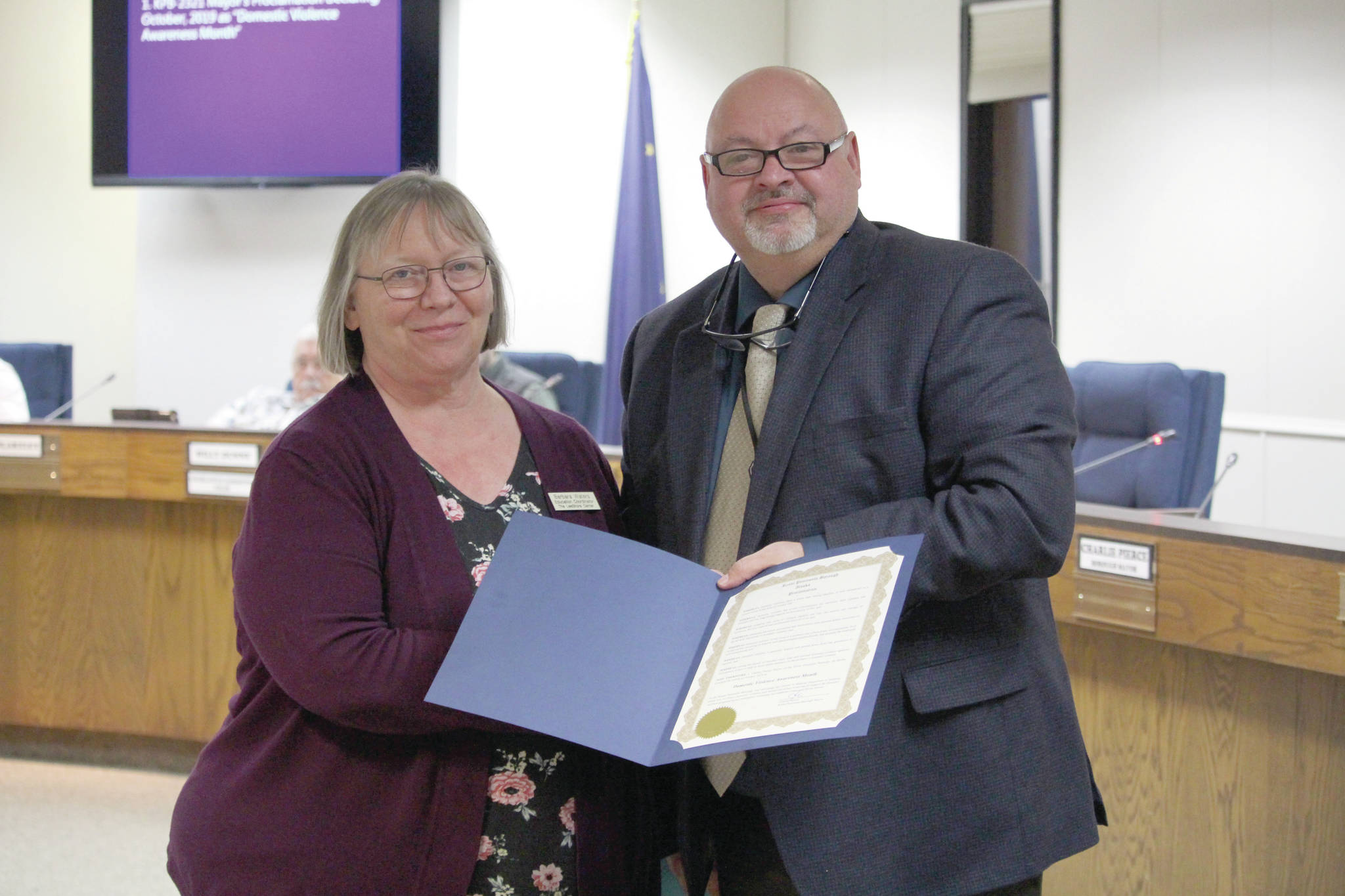October is National Domestic Violence Awareness Month, and local lawmakers took time last week to recognize the LeeShore Center as the primary advocate for survivors on the peninsula while also acknowledging that, when it comes to combatting domestic violence, Alaska still has a long way to go.
“It goes across all genders and socioeconomic backgrounds. It’s something that sticks with the victims for a very long time, and it has repercussions to all of our social programs across the state,” Kenai Mayor Brian Gabriel said during last Wednesday’s luncheon hosted by the Kenai and Soldotna Chambers of Commerce.
At the luncheon, Gabriel and Soldotna Vice Mayor Paul Whitney issued a proclamation recognizing Domestic Violence Awareness month and presented the proclamation to Cheri Smith, executive director of the LeeShore Center in Kenai. A similar proclamation was issued by Chief of Staff James Baisden on behalf of Borough Mayor Charlie Pierce at last Tuesday’s assembly meeting.
“All of us are responsible for this. We really have to make a commitment that we’re going to work hard to address sexual and domestic violence in our communities,” Smith said on Wednesday after receiving the proclamation.
While speaking with the Clarion on Thursday, Smith said that even though domestic violence is still more prevalent in Alaska than in many other states, she believes that things have gotten better over time. Smith has several decades of experience as an advocate for survivors of domestic violence, and the biggest shift she has noticed in recent years has been in the public understanding of the issue.
The LeeShore Center has served as the peninsula’s primary resource for survivors of domestic violence and sexual assault since 1985. As stated on their website, the center has an emergency shelter for women and children who have been displaced as a result of domestic violence or sexual assault as well as services to help provide those survivors with transitional housing.
Some of the services provided by the LeeShore Center include a state-approved Batterer’s Intervention Program, a Child Care Assistance Program, educational support groups and a 24-hour crisis intervention hotline.
Smith said that in 2019, the LeeShore Center had housed 155 women and children in their emergency shelter and placed 33 women and children in transitional housing. The center also answered 1161 crisis calls through their 24-hour hotline and provided walk-in service for 283 individuals.
Advocates at the LeeShore center assisted 91 individuals in receiving protection orders and responded to 23 sexual assaults this year as part of the peninsula’s Sexual Assault Response Team, Smith said.
Statewide, some research indicates that the rate of domestic violence appears to be on the decline. The Alaska Victimization Survey, last conducted by the University of Alaska Anchorage Justice Center in 2015, found that about 8% of women in Alaska had experienced intimate partner violence, sexual violence or both at some point during the previous year. That number was 12% in the 2010 Survey. Over the course of a lifetime, 49% of female respondents in the 2015 survey reported experiencing intimate partner violence, sexual violence or both.
On the Kenai Peninsula, the numbers tell a slightly different story. Kenai Police Chief David Ross told the Clarion that, through the month of September, his department had investigated 60 cases of domestic violence in 2019. Over that same period of time in 2018, the number of cases was 55, and in 2017 it was only 45.
An analysis by the Clarion showed that, as of Oct. 26, around 15% (269 out of 1833) of the criminal charges filed at the Kenai Courthouse this year were related to domestic violence.
Ross said that, like Smith, he too has witnessed a recent cultural shift when it comes to discussing the issue of domestic violence, which may encourage survivors to come forward with more frequency. That being said, some survivors are still unwilling or afraid to come forward and report their abuse.
“It’s hard to quantify something like that, but it is definitely a problem still,” Ross said of domestic violence that goes unreported.
Even though more Americans are recognizing domestic violence as a serious national issue, discussing the subject remains controversial for many people. A survey conducted by the Allstate Foundation in 2018 found that, while 62% of respondents rank domestic violence as an “extremely serious” problem, 34% of respondents also believe domestic violence is a taboo subject. The percentage of people that consider the topic taboo actually increased by 10 points from the previous survey conducted in 2014.
Smith said that awareness is only one piece of the puzzle. In order to deter potential abusers from committing acts of violence and encourage survivors to seek justice, Smith believes that law enforcement should hold those convicted of domestic violence more accountable for their crimes. Currently, Smith feels that the consequences for abusers are not strong enough to deter future behavior. In cases where someone enrolled in LeeShore’s Batterer’s Intervention Program stops participating, for example, Smith believes that the offenders should be remanded back to Wildwood for their noncompliance.
“If we don’t send a strong message that domestic violence is a crime, and if there’s no accountability, the offenders reoffend,” Smith said.
Victims of domestic violence are encouraged to call the LeeShore Center’s 24-hour crisis hotline at 907-283-7257. Those experiencing domestic violence can also visit the Center at 325 South Spruce St. in Kenai, Alaska. The center accepts walk-ins Monday through Friday from 9 a.m to 5 p.m. and is staffed 24/7 in case of emergency.

